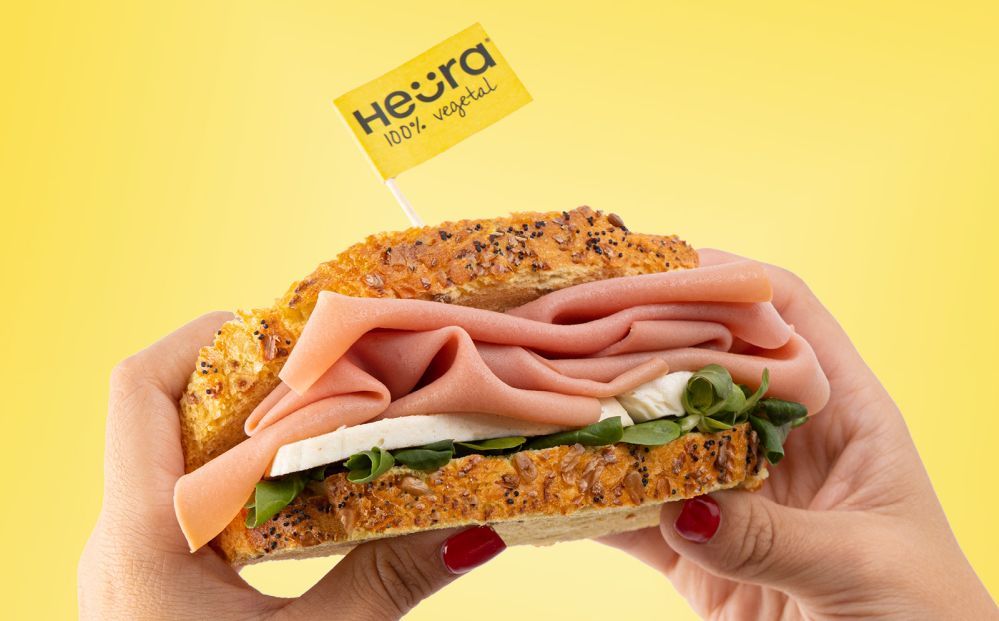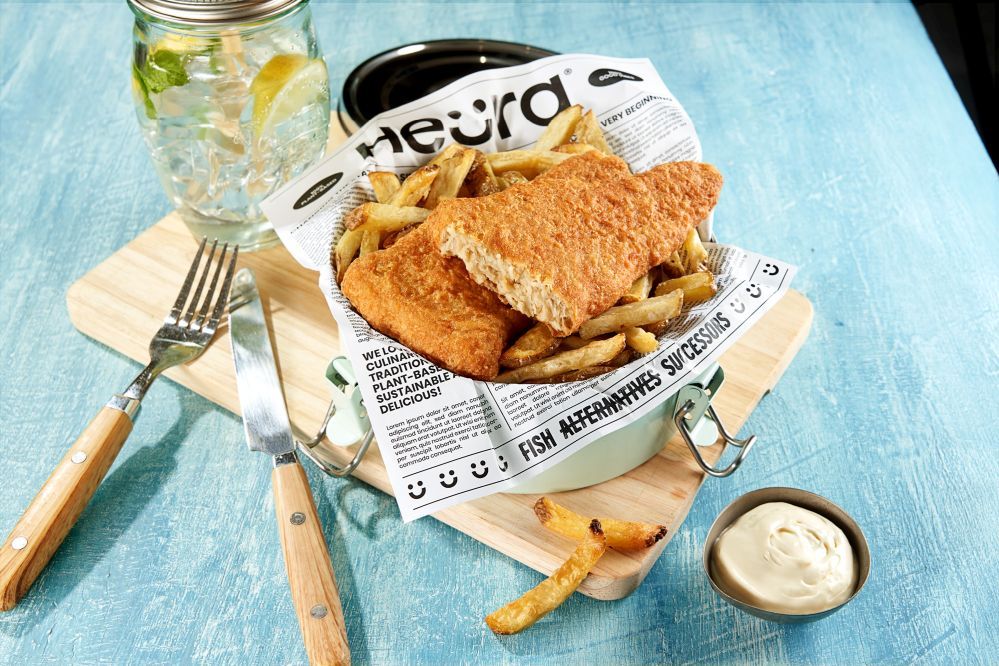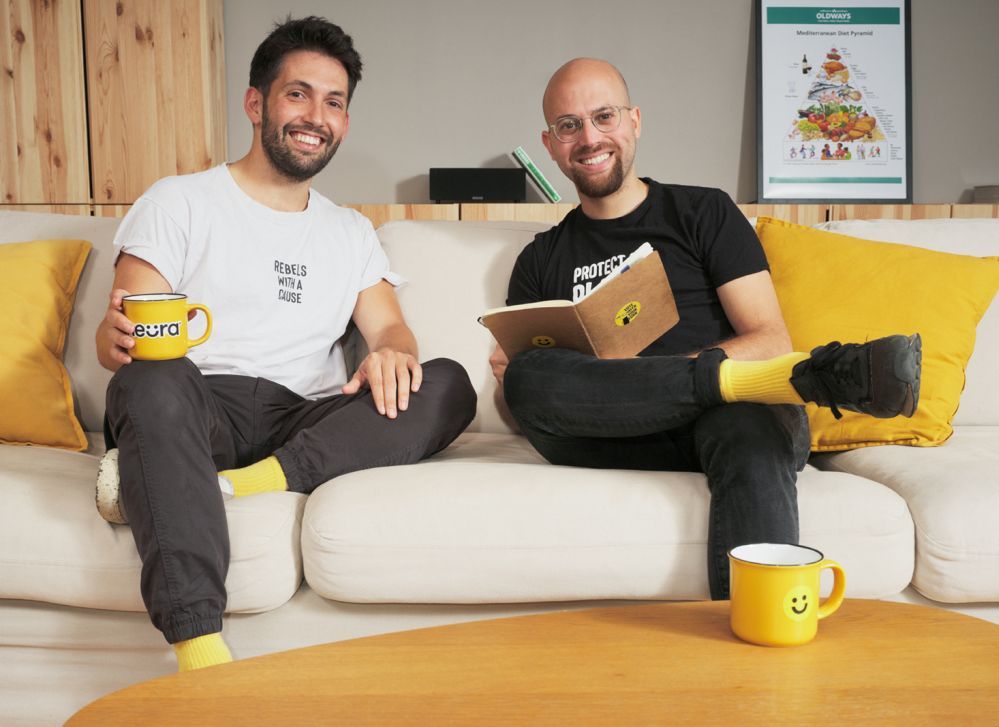Spanish startup Heüra Foods has unveiled its first product manufactured using patent-pending technology it claims is cheaper and more effective than extrusion at texturizing plant proteins, and can also be used for plant-based cheese products.
The additive-free York Ham Style cold cuts—launching now in Spain and France—are made with soy protein, extra virgin olive oil, natural flavors, salt, vegetable concentrates, lemon juice concentrate, cultures, and vitamin B12.
Barcelona-based Heüra, which was founded by Bernat Añaños and Marc Coloma in 2017, has historically used high moisture extrusion to make its soy-based beef, pork, chicken and fish products, which have helped it to garner a 25% share of the Spanish plant-based meat market and a growing presence in other markets from France and Germany to the UK.
The company is keeping details of its new technology—dubbed ‘process-controlled microstructure design’—under wraps but claims the simple process involves a combination of heating, cooling and mixing (the inputs are protein powder, oil, and water), and does not require expensive bespoke equipment.

Higher throughput and lower energy costs than extrusion
The new texturizing process, which can be deployed by Heüra’s contract manufacturing partners, creates emulsions that deliver novel textures and improved functionality, Coloma told AgFunderNews.
“You often hear people say that the problem with alternative proteins is the fat, or the protein, and that we need to develop new ingredients made by precision fermentation, biomass fermentation or cellular agriculture.
“But what we are doing with this microstructure design approach is creating better products using 100% plant-based ingredients with a scalable supply chain and equipment that already exists.
“Our technology is a new way of texturizing plant-based proteins and lipids without extrusion enabling us to create clean label products in categories there were impossible until now, in a scalable and cost-effective way. So for our ham, we don’t need to use additives [such as hydrocolloids] to bind the product together. We can also use [the new technology] for cheese, pasta and a range of other products.”
Science and technology director Isabel Fernández added: “It is higher-throughput and uses a lot less energy than extrusion, and it can generate a wider range of textures. We can also make whole cuts.”
Application potential
The process does not, however, work with products that are sold ‘raw,’ she said. “The technology is based on a novel thermomechanical process, hence there’s a heating step which directly makes it not applicable to ‘cook-from-raw’ products such as burgers, sausages, and meatballs.
“However, the products produced by this technology can be heated without any detrimental effect on the texture. When this ham is heated for a pizza topping, for example, it behaves in the exact same way as the animal counterpart. We’ve received great comments on the taste and texture of the ham in a hot sandwich application, for example.”
She added: “It’s the same when we apply this technology in other product applications that are not yet in the market where consumers heat the product before consumption, be it stir-frying in a pan, oven or microwave. The overall texture remains the same, obviously there’s a certain degree of drying, as happens with animal meat on heating, but we can control that to maintain the desired juiciness. Depending on the food matrix, the Maillard reaction occurs to a greater extent thus enhancing taste.”
Plant-based meats made from whole foods?
In a separate suite of patents Heüra is exploring alternative approaches to making meat alternatives that don’t rely on protein isolates and concentrates, revealed Fernández.
“We are currently drafting three patent applications to be filed next year. In brief, we discovered a way to exploit the functionality of specific plant cell wall materials in their native structures so that we don’t need to go through any extraction process. Some of these materials are byproducts of the food industry.
“Once ready, we will be able to partially or totally replace protein isolates, depending on the product application. They can also be combined with our texturization technology.”

58% repeat purchase rates in Spain
While sales of plant-based meat have begun to stagnate in some European markets, Heüra – which generated sales of €31 million ($33 million) last year— is enjoying double-digit growth, said Coloma.
“In Spain our repeat purchase rate is 58%.”
Backed by around $37 million ($39 million) from investors including NBA star Ricky Rubio and Unovis Capital, Heura generated 80% of the growth in the Spanish plant-based meat market last year, claimed Coloma, who is currently closing the firm’s series B round.
As its new texturizing technology is rolled out to more products, Heüra’s margins will improve, helping the company achieve profitability by 2025, he predicted.
“Our vision is to become the European champion of plant-based meats. Our main markets are Spain and France and we are growing a lot in Austria, Switzerland, UK, Poland, Italy and the Netherlands.”
‘Our vision is to become the European champion of plant-based meats’
Category dynamics in plant-based meat vary in different European markets, said Coloma. “Markets like France and Italy are growing whereas the UK is decreasing year-over-year. I think many people got into the category super-fast with products that didn’t meet consumer expectations; even some multinationals were seeing repeat rates of 30% or lower.
“At one point, more or less everything was getting listed, whereas now, there has been a reconfiguration of the category and retailers are giving more space to products that are giving consumers what they are looking for and enhancing category growth.”
Messaging: ‘Super-tasty and healthy’
While activism for animals and the environment is important to Añaños and Coloma (who like to refer to themselves as ‘Rebels with a cause’), the primary purchase drivers for consumers are taste and health, he said.
“We know that people are coming into this category for health reasons, so we have more protein, less fat and less saturated fat, fewer calories, and a cleaner label. But we are also creating better performance so fat is not released into the pan when you cook the product, and we can create a better experience with less fat in the formulation.
“With this new technology, we will be able to go to the next generation of products that will allow us to reduce costs, and we’ve already communicated that in 2025, the company will be profitable. We are serving consumer needs on one end but also scalability challenges on the other by leveraging existing infrastructure without needing too much capex.”
From a marketing and branding perspective, meanwhile, Heüra talks about “super-tasty and healthy products,” he said. “But humor and joy is also part of it, and optimism, we’re the plant based meat brand with the highest engagement in social media worldwide.”






